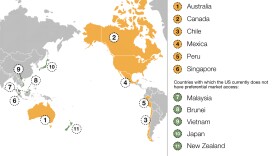By Duane Bolin
http://stream.publicbroadcasting.net/production/mp3/wkms/local-wkms-929501.mp3
Murray, KY – "Life was not always easy," could very well be a universal truism when reflecting on past generations. Commentator Duane Bolin has a new lease on life after a near-death experience. We continue his series of commentaries with a lens on the past, memories of an insurance man in Arlington, Kentucky and the poem, "Abu Ben Adhem" by James Henry Leigh.
I remember Gail Magruder only vaguely. He was an insurance man with an office just a few doors down from my father's pharmacy in Arlington, Kentucky. I can't see the man in my mind's eye, but I remember the respect that my father had for him. In Arlington, along with the Hocker family, my father held Mr. Magruder in high esteem.
My mother and father always remembered the five years that we spent in Arlington as sort of the Golden Age of the Bolin family. My brother and I came into the family there, and that close-knit community served as the perfect, nurturing place for a young family, with all of the possibilities of life stretched out before us.
Friends such as Robert and Mary Helen Hocker and their children, Robert Peck and Melinda, made us feel right at home. A loving church family greeted us into the congregation, and the small, but thriving, business community initiated my father into the intricacies of operating a family-run drugstore. We lived in a small, rental house, just down from the church.
Life was not always easy. Another brother and sister, Timothy and Cathy, both died after living only a day, so my mother and father struggled and suffered especially. Yet, years later, after much of her life had already been lived, my mother remembered those Arlington years with gratitude and even joy.
So did my father. Eventually, he was called to preach, ordained in the Arlington church, and we moved away for my father to attend the seminary. The folks back in Arlington followed our family's progress and my father's ministry, despite the lapse of years. I know this because I have seen some of the cards from the Hockers, along with some of the letters that Mr. Magruder sent to my father after we left Arlington.
Mr. Magruder wrote letters the way letters were meant to be written. In those years before email, his letters were filled with wit and charm. We rarely see letters today, written in that wonderful, some would call it quaint, style. Even as I read those letters second-hand, years after they were written, I feel a kinship with the goodness of Gail Magruder.
Mr. Magruder often filled his letters with poetry, some of the lines his own, others from his favorite poets copied down from memory. In one letter, Mr. Magruder copied out a poem that my father remembered to be one of his favorites, a James Henry Leigh poem, titled "Abou Ben Adhem":
"Abou Ben Adhem (may his tribe increase!)
awoke one night from a deep dream of peace,
And saw, within the moonlight of his room,
Making it rich, and like a lily in bloom,
an angel, writing in a book of gold.
Exceeding peace had made Ben Adhem bold,
And to the Presence in the room he said:
"What writest thou?" The vision raised its head,
And, with a look made of all sweet accord,
Answered, "The names of those who love the Lord."
"And is mine one?" said Abou, "Nay, not so,"
Replied the angel. Abou spoke more low,
But cheerily still, and said, "I pray then, then,
Write me as one who loves his fellow men."
The angel wrote, and vanished. The next night
It came again, with a great awakening light,
And showed the names whom love of God had blest,
And lo! Ben Adhem's name led all the rest."
I've always thought that the poem applied to Gail Magruder, although I think he included it in his letter as a tribute to my father and mother, as a way to describe the way James Wesley and Cammie Bolin lived their lives. For them and for their friends, the Hockers and the Magruders of the world, to love is to live, and to live is to love. The poem, "Abou Ben Adhem" is about a Sufi saint, but the poem also summarizes the greatest two commandments of Christendom: "`Love the Lord your God with all your heart and with all your soul and with all your mind.' . . . And the second is like it: `Love your neighbor as yourself.'"
Duane Bolin teaches in the Department of History at Murray State University. He may be reached at duane.bolin@murraystate.edu





